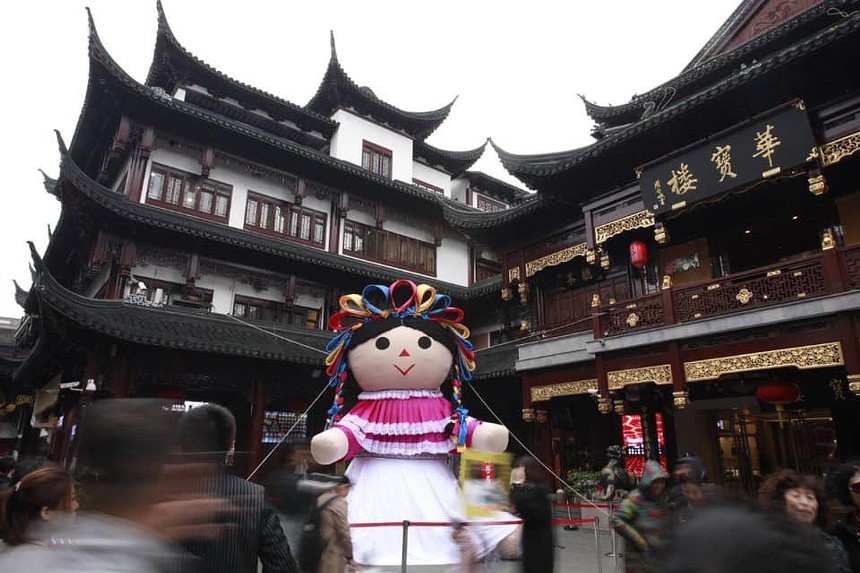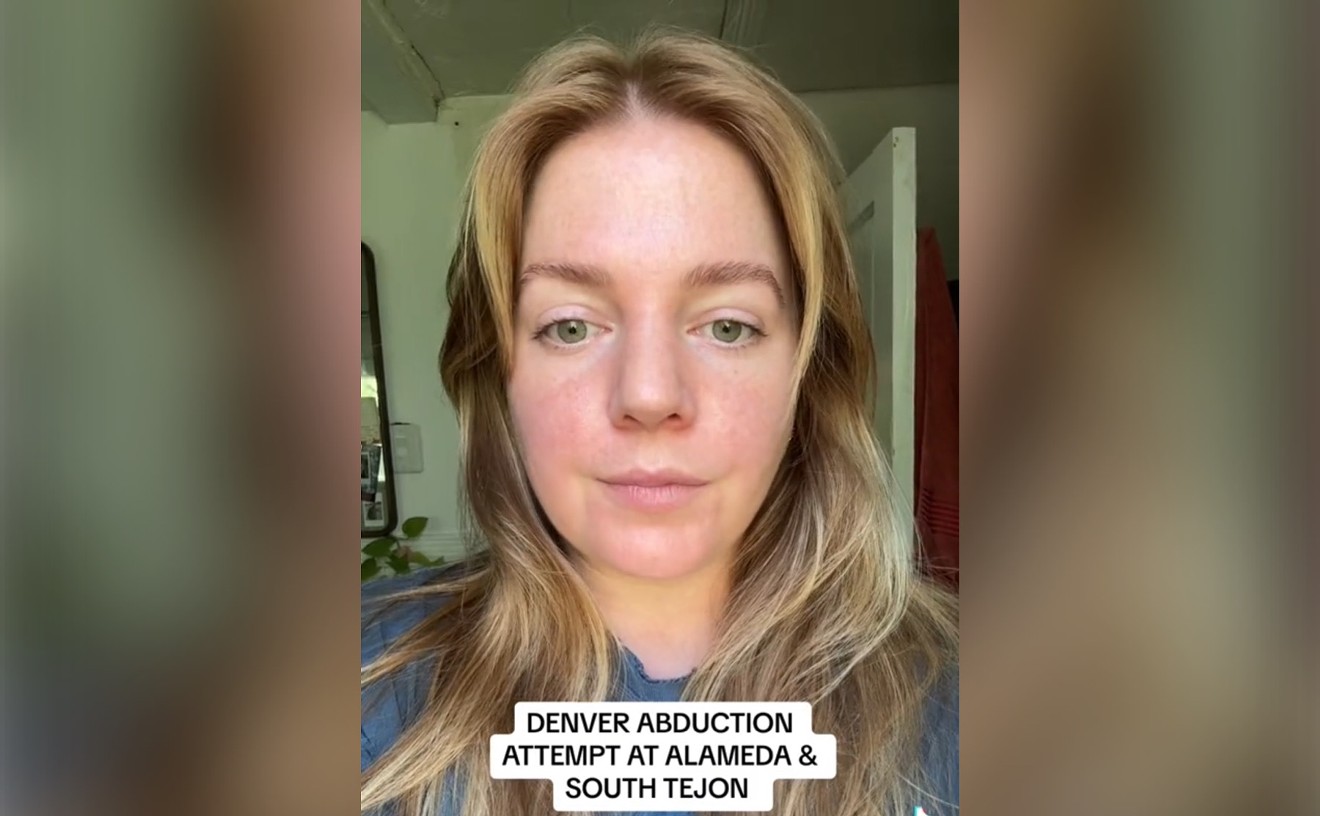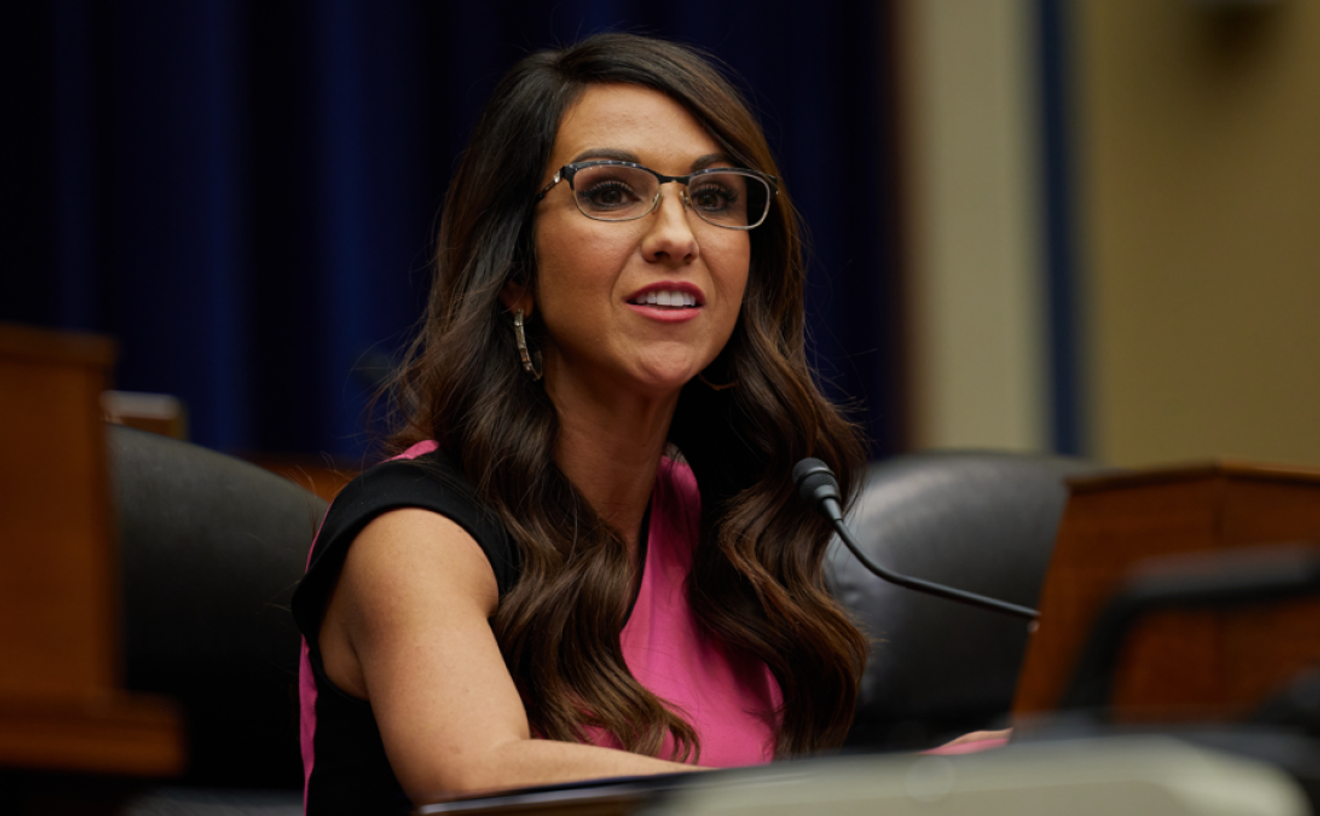A giant, fifteen-foot version of Mexico's famous "Lele" doll has been gallivanting around the globe and is scheduled to appear in Denver this week for the inaugural Cities Summit of the Americas, which runs from April 24 to April 28.
Reminiscent of the classic American paper cutout Flat Stanley, Lele dolls have appeared around the world to show off Mexico's colorful culture and artisan crafts. The handmade dolls are usually made of cloth and are pocket-sized, but they occasionally appear in cities inflated and towering over residents.
The birthplace of Lele is considered to be Amealco de Bonfil in the state of Querétaro, where the doll originated as a small craft sold by artisans, according to officials. The town now hosts a museum dedicated to Lele's history.
Mayor Michael Hancock will unveil the giant Lele on Wednesday at 9:30 a.m. in front of the downtown Denver Partnership Building. Cultural activities for kids will start at 9:15 a.m., and the Colorado-based female mariachi group Las Dahlias is scheduled to perform.
Mayor Hancock will present Lele alongside the Consul General of Mexico in Denver, Pável Meléndez, as well as Alexis Newton, the founder of Latinas Lideres y Emprendedoras, and FloraJane DiRienzo, the executive director of the Biennial of the Americas, which helped bring the Cities Summit of the Americas to Denver.
Lele is "a symbol of Indigenous peoples, Indigenous cultures, and so to be able to bring her as part of the Cities Summit of the Americas from Mexico as a representation of Querétaro is really important," Newton notes.
"It honors not only Indigenous communities, but traditions and cultures in Mexico," she says.
Newton spearheaded the effort to bring Lele to Denver after she made a trip to Querétaro in 2021 and saw the giant doll — where it's permanently housed when it's not traveling — for herself.
"How amazing," she thought. "If she's already traveled the world, how can we get her to Denver?" Once travel restrictions eased, she decided to highlight Lele's arrival with a culture and arts event. The news that Denver would host the first Cities Summit of the Americas presented the perfect opportunity.
"This is the perfect example of collaboration that comes when you bring people together," DiRienzo says. "With Querétaro, they have this unique, iconic doll, so what an exciting opportunity to partner with other community organizations to ensure she was able to join us."
Lele is "a symbol of Indigenous peoples, Indigenous cultures, and so to be able to bring her as part of the Cities Summit of the Americas from Mexico as a representation of Querétaro is really important," Newton notes.
"It honors not only Indigenous communities, but traditions and cultures in Mexico," she says.
Newton spearheaded the effort to bring Lele to Denver after she made a trip to Querétaro in 2021 and saw the giant doll — where it's permanently housed when it's not traveling — for herself.
"How amazing," she thought. "If she's already traveled the world, how can we get her to Denver?" Once travel restrictions eased, she decided to highlight Lele's arrival with a culture and arts event. The news that Denver would host the first Cities Summit of the Americas presented the perfect opportunity.
"The Cities Summit seemed like the perfect fit to bring a piece of Mexico's culture here to Denver," Newton says. "We have such a large Mexican population here in Denver — the Latino community is growing, and it grows every year — and I think any time you can bring a true representation from the country of origin for so many people that are now living in the United States, in Colorado, it brings such joy and a feeling of being proud of where one comes from."
Denver will get to host the inflated Lele in front of three different downtown landmarks: the Skyline Park Clocktower, Union Station and then the Convention Center, which is hosting the official Cities Summit events.
The smaller Lele dolls that have become famous over the years are made out of cloth and meant to look like a member of the Otomi people, an Indigenous population from Querétaro and surrounding areas in Central Mexico. The name Lele translates to "baby" in the Otomi language, and the doll has long black braided hair with crowns of colorful bows that go with her various dresses.
Because of Lele's worldwide popularity, the office of the Mexican Secretary of Foreign Affairs — akin to the U.S. Department of State — launched the #LelePorElMundo campaign in January to drop off giant Lele dolls at different parts of the world to show off the country's positive diplomatic relations. The #LelePorElMundo campaign started with Lele visiting the capital city of Baku, Azerbaijan in January, and since then, Mexican consulates and embassies have photographed Lele in numerous other cities, such as Barcelona and Nairobi.
Mexican officials have also photographed the Lele doll in American cities such as Portland, Oregon, Austin, Texas, and Philadelphia. Lele typically visits iconic locations like the Tower Bridge in London and Yu Yuan Garden in Shanghai, China.
Unlike the cheap, paper-made Flat Stanley, authentic handmade Lele dolls cost between $300 and $1,000 because they're made in Querétaro by female artisans from the communities of Santiago de Mexquititlán and San Ildefonso Tultepec, who have been passing down the tradition generation by generation.
In 2018, the Mexican government declared Lele to be an object of Cultural Heritage of the State of Querétaro because of its importance to the country's culture and the Otomí people. The doll shows "the manifestations and cultural traditions of our community, as well as its ethnic and linguistic diversity," according to the Mexican Foreign Affairs office.
"The Lele doll is a representation of the Mexican culture and heritage that so many are proud of," Newton says. "Having Lele, a cultural icon, come to Denver shows the close connection that we in Colorado share with Mexico."
In 2018, the Mexican government declared Lele to be an object of Cultural Heritage of the State of Querétaro because of its importance to the country's culture and the Otomí people. The doll shows "the manifestations and cultural traditions of our community, as well as its ethnic and linguistic diversity," according to the Mexican Foreign Affairs office.
The unveiling of the 15-foot Lele doll will take place on Wednesday at 9:30 a.m. at Skyline Park, with activities for children starting beforehand at 9:15 a.m.













